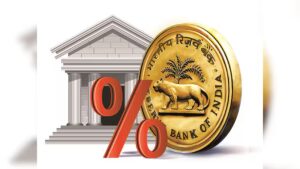UPSC Relevance
- GS-3: Economy – Monetary Policy, Trade and Tariff Policies
- GS-2: International Relations – India-U.S. Trade Relations, Global Protectionism

Key Points: RBI’s Repo Rate Reduction & Policy Change
- The Reserve Bank of India (RBI) lowered the repo rate by 25 basis points to 6% to boost economic activity amid global uncertainties.
- The RBI shifted its stance from “neutral” to “accommodative”, signaling potential for further cuts.
- This is expected to reduce borrowing costs for businesses, homeowners, and retail borrowers.
Impact of U.S.-China Trade Conflict
- Triggered by President Trump’s imposition of 125% tariffs on Chinese goods, alongside a 10% universal tariff.
- China responded with 84% tariffs, reminiscent of the 1930 Smoot-Hawley Act’s protectionist policies.
- Indian exporters urged the government to accelerate bilateral trade negotiations with the U.S. to mitigate the fallout.
Economic Growth & Inflation Projections
- The RBI revised its FY GDP forecast downward from 6.7% to 6.5%.
- Retail inflation fell to 3.61%, but sharp declines in food prices raised deflation concerns.
- The policy aims to maintain liquidity and economic confidence despite global challenges.
Trade Barriers vs. Economic Resilience
- The editorial cautions against knee-jerk protectionism.
- It advocates for building competitive strengths, citing the U.S. model of leadership in research and innovation.
Analysis & Path Forward
- While monetary easing is beneficial, fiscal stimulus and structural reforms are vital for sustained growth.
- India should diversify exports, pursue strategic trade agreements, and avoid over-dependence on tariffs.
- Focus on stable governance and predictable policies to leverage India’s inherent strengths.




